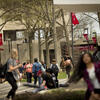Demonstration Guidelines
Temple University affirms the right of our community members to engage in peaceful and orderly demonstrations. For the purposes of these Guidelines, a demonstration is any public display in support of, or in opposition to, any person, candidate, political party, group, organization, cause, institution, idea, or policy.
These Guidelines outline the University’s parameters that must be followed by individuals involved in a demonstration on domestic University campuses.1
Individuals or groups of University community members, or members of the public, who engage in demonstrations on Temple’s domestic campuses must, as a condition of use, assure that there will be no disruption or obstruction of the educational process or infringement upon the rights of other members of the University community.
Such demonstrations must be compliant with all applicable federal, state, or local laws and ordinances, these “On-Campus Demonstration Guidelines,” and all other applicable University policies, regulations, and guidelines, including the Student Conduct Code and the Employee Manual and Rules of Conduct.
The University maintains the right to regulate and monitor, without regard to content or viewpoint, the time, place, and manner of any proposed on-campus demonstrations as may be necessary to help ensure the safety and well-being of community members and the orderly conduct of classes and other functions of the University.
The University neither permits nor forbids demonstrations off-campus by members of the University community. Individuals demonstrating off-campus are reminded that they are expected to act in a manner that will conform to all federal, state, and municipal laws and ordinances, and applicable University policies.
For all demonstrations on University property, please note the following:
- All demonstrations must adhere to the University’s policies regarding reserving University space/facilities, available at: Use of University Facilities (04.34.01) and Space Management and Scheduling (04.34.11). Reserving or occupying space overnight, either outside or in a building other than a student’s own residence hall, is prohibited unless prior authorization has been obtained in accordance with the above-referenced policies.
- No demonstration shall materially impede or obstruct pedestrian and/or vehicular traffic.
- No demonstration shall block or otherwise interfere with any individual’s ability to enter or exit any University property (buildings/patios/plaza/gathering spaces, etc.).
- Demonstrators shall not engage in any behavior or activity that causes or threatens to cause physical injury to another person.
- No demonstration shall cause damage to or the destruction of any property.
- No demonstration shall obstruct or disrupt activity related to the University’s educational process, including, but not limited to, activity occurring in classrooms, offices, laboratories or other University facilities or grounds, except as may be permitted under the above referenced policies, which outline appropriate means to demonstrate during a sponsored event.
- Use of torches, oil lamps, tiki lamps or similar open flame devices or potential fire hazards are prohibited during any demonstration. Use of candles and luminaries during religious or ceremonial events may be permitted as outlined in the Space Management and Scheduling Policy.
- Use of sound/voice amplifiers is prohibited inside University owned or controlled facilities. Use of sound/voice amplifiers is also prohibited outside if it disrupts activity related to the University’s educational process. Additional details and limitations related to amplified sound can be found at: Space Management and Scheduling Policy.
- Distributing or posting literature is acceptable provided that such activity adheres to relevant University policy, which can be found at: Political Campaign Activities and Flyer Posting Policy.
University officials or law enforcement agents may move or request the removal of any demonstrator or participant believed to be in violation of federal, state, or municipal laws and ordinances, and all university policies, regulations, and guidelines. Any individual is encouraged to report an incident that they believe violates applicable law to Temple University Department of Public Safety. You may also report an incident you believe to be a violation of Temple University's policies, regulations, and guidelines. If you have a question or an inquiry regarding Temple University's policies and procedures, you may also use this link and select the "Inquiry" category.
1 International campuses are subject to local laws and regulations and policies promulgated by local administration, as approved by the university.

